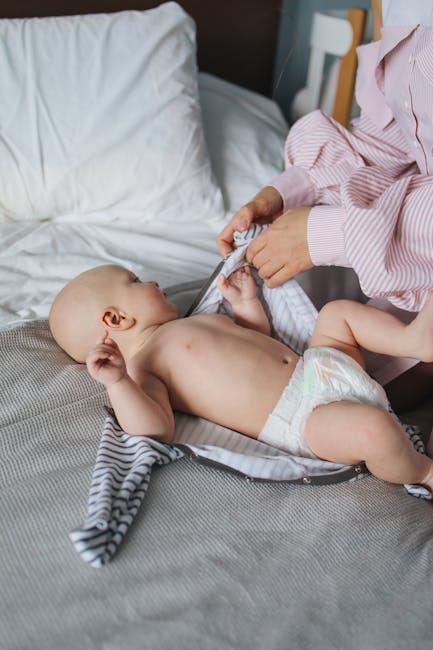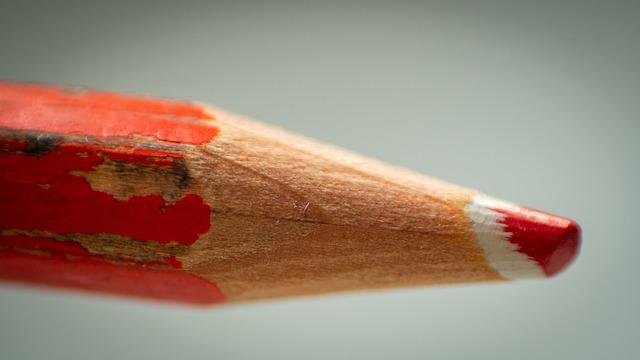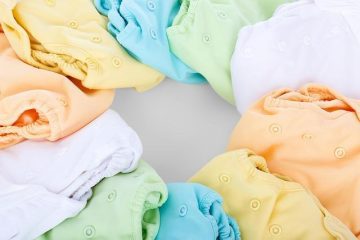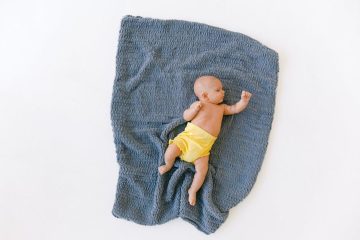Table of Contents
- Understanding the Functionality and Benefits of Diaper Genie Bags
- Choosing the Right Diaper Genie Bags for Your Needs
- Tips for Efficiently Changing and Disposing of Diapers
- Alternatives to Diaper Genie Bags Worth Considering
- Sustainable Practices in Diaper Disposal and Recycling Options
- Q&A
- To Wrap It Up
Understanding the Functionality and Benefits of Diaper Genie Bags
Diaper Genie bags are specifically designed to simplify the disposal of used diapers, ensuring your nursery remains fresh and clean. Unlike regular garbage bags, these specialized bags employ a multi-layered film that works effectively to trap unpleasant odors and bacteria. This innovative feature is a game-changer for busy parents, preventing the smell from lingering while maintaining hygiene in the home. The essential functionality of Diaper Genie bags lies in their compatibility with the Diaper Genie system, allowing for a seamless and efficient diaper disposal process.
One of the standout benefits of using Diaper Genie bags is their ability to hold a significant number of diapers while reducing waste. This efficient storage feature minimizes the frequency of bag changes, allowing parents to focus more on their baby and less on household chores. Additionally, the hands-free mechanism of the Diaper Genie system, coupled with the durability of the bags, means that disposal can occur with minimal fuss, maximizing convenience during diaper changes.
Moreover, these bags not only keep the environment in and around the baby’s space clean but are also designed with safety in mind. Made from non-toxic materials, they provide peace of mind for parents concerned about their little one’s health. The combination of odor control, ease of use, and safety makes Diaper Genie bags an essential addition to any nursery setup, proving to be a worthwhile investment in everyday parenting.


Choosing the Right Diaper Genie Bags for Your Needs
When selecting bags for your Diaper Genie, it’s essential to consider several factors that will enhance your experience. The first attribute to look for is the capacity of the bags. Different models offer varying sizes, which can affect how often you need to empty the bin. If you have multiple children or expect heavy diaper usage, opting for larger capacity bags can save you time and ensure you’re not refilling the device frequently.
Another important consideration is the odor control of the bags. Many bags come with special odor-lock technology that helps contain unpleasant smells, ensuring that your home remains fresh. Look for options formulated with antimicrobial properties, which can be especially beneficial in maintaining hygiene when disposing of used diapers. This not only keeps your kitchen or nursery smelling clean but also helps to prevent bacteria buildup.
the material of the bags plays a significant role in durability and environmental impact. While traditional plastic bags are widely available, many brands now offer biodegradable alternatives that are better for the planet. When comparing choices, create a simple table to weigh the pros and cons of different options:
| Bag Type | Pros | Cons |
|---|---|---|
| Standard Plastic | - Cost-effective – Widely available | – Not eco-friendly – Limited durability |
| Odor-Control | – Excellent smell containment – Often thicker | – Can be pricier – May still be plastic |
| Biodegradable | – Environmentally friendly - Reduces landfill waste | – Generally higher cost – Availability issues |
By weighing these considerations, you can make an informed decision that aligns with your family’s needs and values, ultimately ensuring a smoother experience when managing your diaper disposal.


Tips for Efficiently Changing and Disposing of Diapers
Efficient diaper changes are essential for both the comfort of your baby and your sanity. To streamline the process, be sure to have all your supplies within reach before you start. This includes clean diapers, wipes, a changing pad, and the Diaper Genie. Keeping a designated changing station stocked will save time and reduce stress during those inevitable diaper emergencies. Each time you change your baby, remember to dispose of the used diaper immediately in the Diaper Genie to prevent odors and maintain cleanliness.
When it comes to disposal, you’ll appreciate the benefits of using the right bags. Diaper Genie bags are designed to contain odors effectively, ensuring that your living space stays fresh. To optimize their use, consider the following tips:
- Seal the bag tightly to lock in odors.
- Store used diapers properly within the Diaper Genie until it’s time to empty.
- Change the bag regularly to minimize buildup and keep the unit functioning well.
For those wondering how often to change the Diaper Genie bag, it depends on the number of diapers your baby uses daily. Having a robust routine can make a significant difference. Here’s a simple guideline:
| Diapers per Day | Bag Change Frequency |
|---|---|
| 1-5 | Every 3-5 days |
| 6-10 | Every 2-3 days |
| 11+ | Daily |
Incorporating these strategies into your routine will not only simplify diaper changes but also make the entire process more pleasant. Remember, consistency is key! Adopting these efficient methods ensures a smoother experience for both you and your baby.


Alternatives to Diaper Genie Bags Worth Considering
While Diaper Genie bags are popular for their effectiveness in odor control, several alternatives can provide equally compelling solutions. Some parents may seek options that are more environmentally friendly, cost-effective, or even just different in style. Here are a few suggestions:
- Biodegradable Diaper Bags: These eco-friendly options are designed to break down more quickly than traditional plastic bags, reducing landfill waste. Brands like Oli & Carol and Bambo Nature offer bags made from natural materials that can alleviate environmental concerns.
- Cloth Diapering: For a sustainable choice, parents might consider cloth diapers paired with a wet bag. This method significantly reduces waste generation and can save money in the long run. Look for durable, waterproof wet bags that come in various sizes and styles.
- Odor-Neutralizing Pails: Some diaper pails are designed to work without the need for special bags. Models like the Ubbi and Playtex offer airtight seals and effective odor control while allowing you to use regular garbage bags, making them versatile and budget-friendly.
In addition to these alternatives, it’s worth exploring any secondary products that can enhance diaper disposal strategies. For instance, using scented liners or deodorizers can further minimize smells when dealing with conventional waste bins. Adjustable pails that can accommodate various bag sizes may also provide flexibility, allowing you to recycle existing trash bags without rending their effectiveness.
| Alternative Product | Key Features | Cost Effectiveness |
|---|---|---|
| Biodegradable Diaper Bags | Eco-friendly, break down faster | Varies by brand, generally moderate |
| Cloth Diapers | Washable, reusable options | High initial, low long-term cost |
| Odor-Neutralizing Pails | Airtight seal, regular trash bags | Cost-effective, reusable |
These alternatives present viable options for those looking to diversify their diaper disposal methods. By considering these choices, parents can find solutions that align with their personal values and budgets while maintaining a clean and odor-free environment for their little ones.


Sustainable Practices in Diaper Disposal and Recycling Options
When considering the environmental impact of diaper disposal, it’s crucial to explore options that minimize waste and promote sustainability. Traditional diaper disposal often leads to overflowing landfills, where diapers can take hundreds of years to decompose. Embracing sustainable practices helps reduce this burden. Some parents are turning to biodegradable diaper options and composting systems designed for diapers, which can significantly lessen the environmental footprint. These alternatives not only reduce landfill waste but also allow for a more natural breakdown of materials that won’t harm the earth.
In addition to using eco-friendly diapers, parents can also focus on the disposal methods for used products. One effective option is the use of specialized diaper disposal systems, such as diaper genies. These devices are designed to seal in odors and keep waste contained, but many now come with recycling features that separate non-biodegradable elements for proper processing. By collecting the appropriate materials, parents can participate in local recycling initiatives and ensure that as much material as possible is repurposed. Parents should check with local waste management facilities about specific recycling programs that accommodate diaper waste for a more thorough approach to diaper disposal.
| Biodegradable Diapers | Traditional Diapers |
|---|---|
| Break down within 75-150 days | Can take over 500 years to decompose |
| Made from plant-based materials | Typically made from plastic and synthetic materials |
| Less impact on landfills | Contributes to growing waste problem |
Ultimately, a conscious effort to choose sustainable practices in diaper disposal can lead to substantial environmental benefits. Encouraging communities to adopt these practices, along with providing education about available disposal and recycling options, fosters a cleaner planet for future generations. Engaging with neighbors, friends, or local parenting groups can help spread awareness, promoting not only individual responsibility but also collective action in the quest for sustainability. The shift towards eco-friendly diaper solutions is more than just a trend—it’s a commitment to improving the world’s health and well-being.
Q&A
Q&A on Diaper Genie Bags
Q1: What are Diaper Genie bags? A: Diaper Genie bags are specially designed, odor-blocking bags used in Diaper Genie disposal systems. They ensure that dirty diapers are sealed in a way that prevents unpleasant odors from escaping, making diaper disposal more convenient and hygienic for parents.Q2: How do Diaper Genie bags work? A: These bags use a multi-layer technology that traps odors and reduces the chance of leaks. When a diaper is placed in the Diaper Genie, the bag seals tight, creating a barrier that keeps the smell contained and allows for easy disposal when the bag is full.
Q3: Are all Diaper Genie bags the same? A: No, different models of Diaper Genie bags are available to fit various Diaper Genie models, such as the Diaper Genie Elite and Diaper Genie Expressions. It’s essential to check compatibility before purchasing to ensure the bags will fit your specific disposal system.
Q4: How many diapers can one Diaper Genie bag hold? A: The capacity of a Diaper Genie bag varies depending on the model, but generally, one bag can hold between 30 to 50 diapers, depending on their size. This makes it convenient for busy parents, as they can reduce the frequency of taking out the trash.
Q5: Can I use any garbage bag instead of Diaper Genie bags? A: While you might be tempted to use regular garbage bags, it’s not advisable. Regular bags won’t fit properly or offer the same odor-blocking features. They may also lead to inefficiencies in the Diaper Genie mechanism, resulting in potential jams and spills.
Q6: How often should I change the Diaper Genie bag? A: It’s best to change the bag when it’s full or when you notice odors becoming more noticeable. Depending on your diaper usage, this could be anywhere from a few days to a week. Regularly monitoring it will keep your nursery smelling fresh.
Q7: Are Diaper Genie bags eco-friendly? A: Diaper Genie bags are designed primarily for convenience and odor control, and while they are durable and effective, they are not biodegradable. For eco-conscious parents, it’s key to consider alternatives or proper disposal methods for diaper waste.
Q8: Where can I buy Diaper Genie bags? A: Diaper Genie bags can be found in most grocery and drug stores, as well as online retailers. Many parents find it convenient to buy them in bulk to save on cost and ensure they always have a supply on hand.
Q9: Can I reuse Diaper Genie bags? A: No, Diaper Genie bags are designed for single use only. Reusing them can result in odors and hygiene issues, so it’s best to use a fresh bag for each batch of diapers to maintain a clean and odor-free environment.
Q10: Do Diaper Genie bags come in different sizes? A: Diaper Genie bags are generally sold in a standard size that fits their respective disposal systems. However, some brands offer larger capacity bags designed for specific high-use situations. It’s a good idea to check the packaging for the exact dimensions and compatibility with your unit.
By addressing these commonly asked questions, this Q&A aims to provide clarity and insight into the practicality and function of Diaper Genie bags, helping parents make informed decisions about their diaper disposal needs.




0 Comments